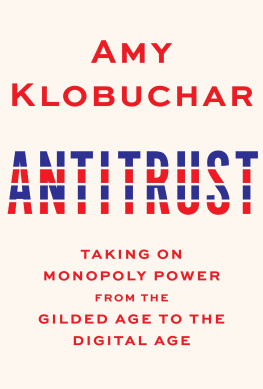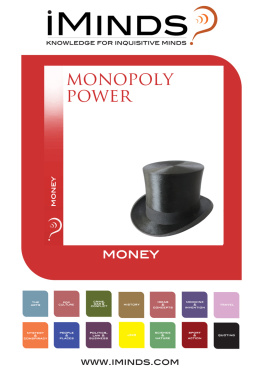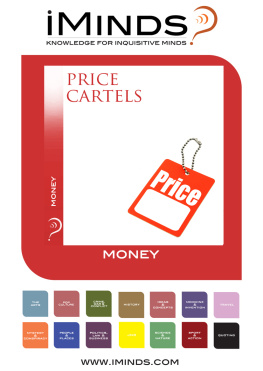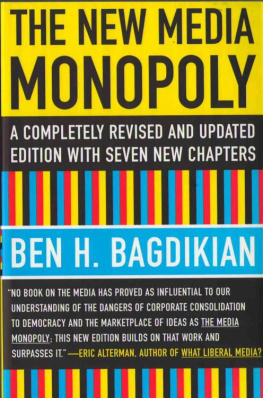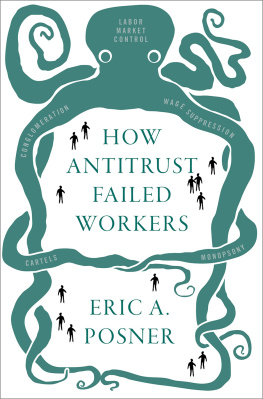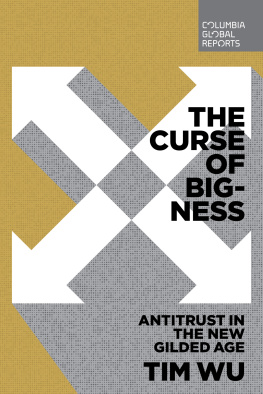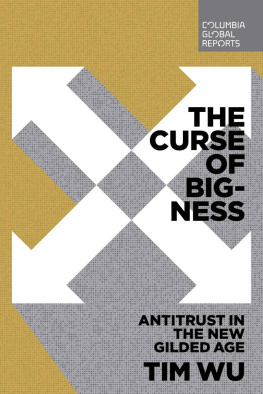Amy Klobuchar - Antitrust: Taking on Monopoly Power from the Gilded Age to the Digital Age
Here you can read online Amy Klobuchar - Antitrust: Taking on Monopoly Power from the Gilded Age to the Digital Age full text of the book (entire story) in english for free. Download pdf and epub, get meaning, cover and reviews about this ebook. year: 2021, publisher: Knopf Doubleday Publishing Group, genre: Politics. Description of the work, (preface) as well as reviews are available. Best literature library LitArk.com created for fans of good reading and offers a wide selection of genres:
Romance novel
Science fiction
Adventure
Detective
Science
History
Home and family
Prose
Art
Politics
Computer
Non-fiction
Religion
Business
Children
Humor
Choose a favorite category and find really read worthwhile books. Enjoy immersion in the world of imagination, feel the emotions of the characters or learn something new for yourself, make an fascinating discovery.
- Book:Antitrust: Taking on Monopoly Power from the Gilded Age to the Digital Age
- Author:
- Publisher:Knopf Doubleday Publishing Group
- Genre:
- Year:2021
- Rating:5 / 5
- Favourites:Add to favourites
- Your mark:
- 100
- 1
- 2
- 3
- 4
- 5
Antitrust: Taking on Monopoly Power from the Gilded Age to the Digital Age: summary, description and annotation
We offer to read an annotation, description, summary or preface (depends on what the author of the book "Antitrust: Taking on Monopoly Power from the Gilded Age to the Digital Age" wrote himself). If you haven't found the necessary information about the book — write in the comments, we will try to find it.
Amy Klobuchar: author's other books
Who wrote Antitrust: Taking on Monopoly Power from the Gilded Age to the Digital Age? Find out the surname, the name of the author of the book and a list of all author's works by series.
Antitrust: Taking on Monopoly Power from the Gilded Age to the Digital Age — read online for free the complete book (whole text) full work
Below is the text of the book, divided by pages. System saving the place of the last page read, allows you to conveniently read the book "Antitrust: Taking on Monopoly Power from the Gilded Age to the Digital Age" online for free, without having to search again every time where you left off. Put a bookmark, and you can go to the page where you finished reading at any time.
Font size:
Interval:
Bookmark:
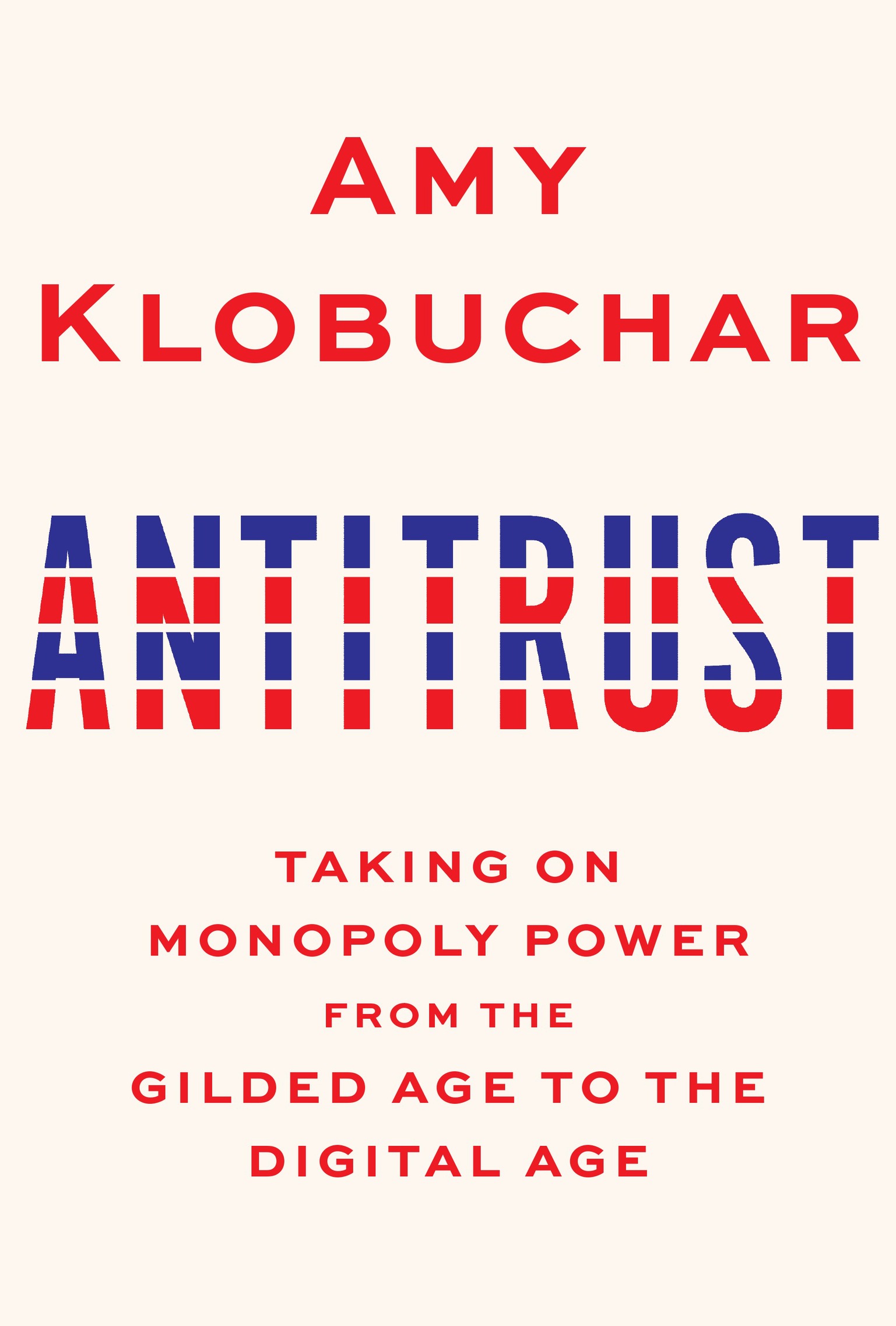
The Senator Next Door
Uncovering the Dome
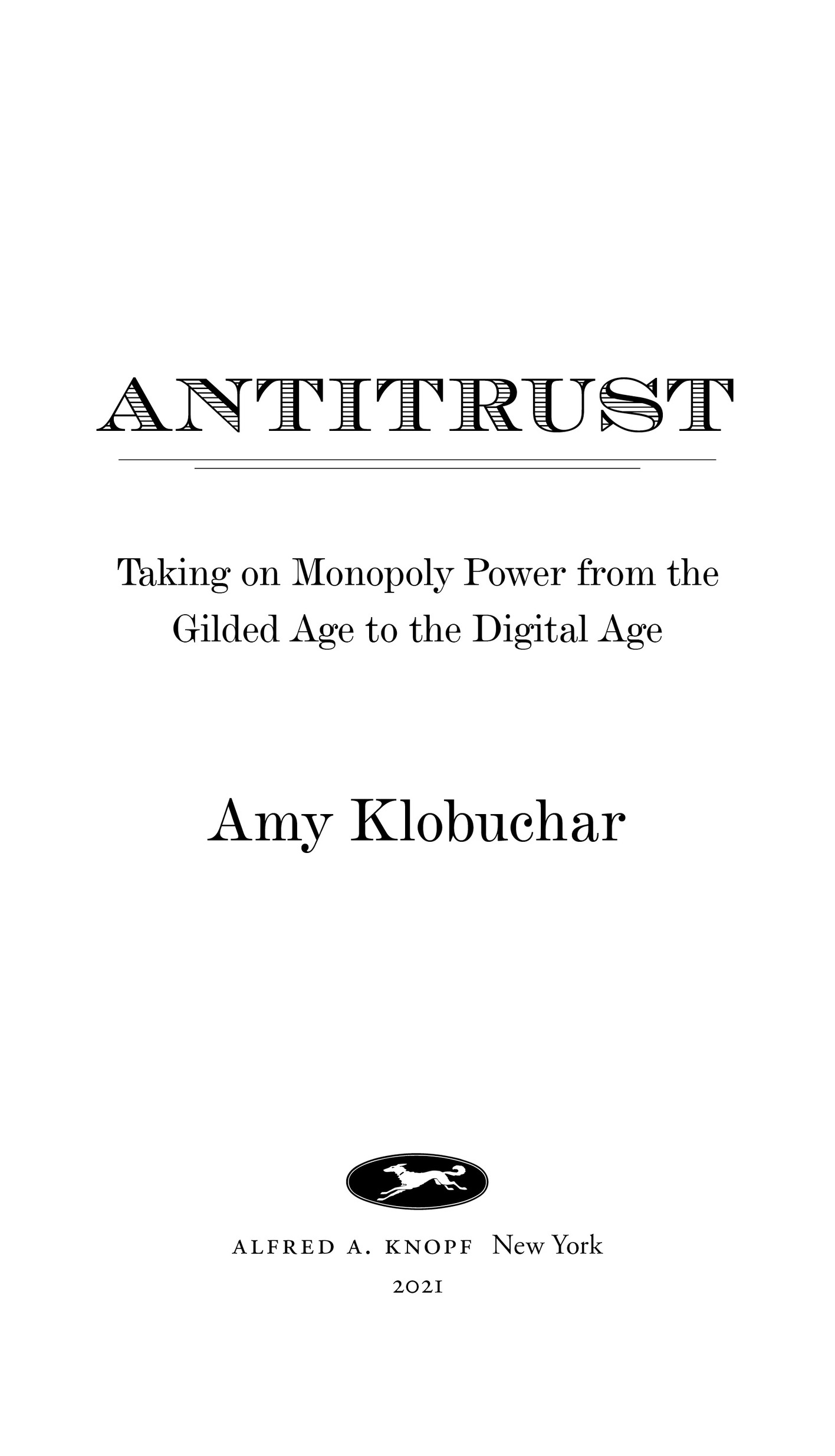
THIS IS A BORZOI BOOK
PUBLISHED BY ALFRED A. KNOPF
Copyright 2021 by Amy Klobuchar
All rights reserved. Published in the United States by Alfred A. Knopf, a division of Penguin Random House LLC, New York, and distributed in Canada by Penguin Random House Canada Limited, Toronto.
www.aaknopf.com
Knopf, Borzoi Books, and the colophon are registered trademarks of Penguin Random House LLC.
Library of Congress Cataloging-in-Publication Data
Names: Klobuchar, Amy, author. |
Title: Antitrust: taking on monopoly power from the gilded age to the digital age / Amy Klobuchar
Description: First edition. | New York: Alfred A. Knopf, a division of Penguin Random House LLC , 2021. | Includes index.
Identifiers: LCCN 2020044843 (print) | LCCN 2020044844 (ebook) | ISBN 9780525654896 (hardcover) | ISBN 9780525654902 (ebook)
Subjects: LCSH : Antitrust lawUnited States. | Antitrust law United StatesHistory. | Competition, UnfairUnited StatesHistory. |
Restraint of tradeUnited StatesHistory. | United States. Sherman Act. | Roosevelt, Theodore, 18581919.
Classification: LCC KF 1649 . K 58 2021 (print) | LCC KF 1649 (ebook) | DDC 343.7307/2109dc23
LC record available at https://lccn.loc.gov/2020044843
LC ebook record available at https://lccn.loc.gov/2020044844
Ebook ISBN9780525654902
Cover design by Emily Mahon
ep_prh_5.7.0_c0_r0
To my husband, John, a true scholar of the law who has a monopoly on my affections
Corporations, and especially combinations of corporations, should be managed under public regulation. Experience has shown that under our system of government the necessary supervision can not be obtained by State action. It must therefore be achieved by national action. Our aim is not to do away with corporations; on the contrary, these big aggregations are an inevitable development of modern industrialism.We are not hostile to them; we are merely determined that they shall be so handled as to subserve the public good. We draw the line against misconduct, not against wealth.
President Theodore Roosevelt ,
State of the Union address (1902)
Antitrust laws in general, and the Sherman Act in particular, are the Magna Carta of free enterprise. They are as important to the preservation of economic freedom and our free enterprise system as the Bill of Rights is to the protection of our fundamental personal freedoms. And the freedom guaranteed each and every business, no matter how small, is the freedom to competeto assert with vigor, imagination, devotion, and ingenuity whatever economic muscle it can muster.
Justice Thurgood Marshall ,
United States v. Topco Associates, Inc. (1972)
My work with our nations antitrust laws started with a phone call in 2008. More than a year after I was sworn in as Minnesotas junior U.S. senator, a pharmacist at Childrens Hospital in Minneapolis called our office. He told our staff that the price of a life-saving drug used to treat premature babies with heart valve defects had suddenly gone up astronomically, and he was calling for help.
A few weeks later I met with Alan Goldbloom, then president of Minnesotas Childrens Hospitals and Clinics. He confirmed everything the pharmacist had said. Ovation Pharmaceuticalsa company headquartered in Deerfield, Illinoishad bought the drug indomethacin from the mega drug company Merck and was selling it under the brand name Indocin IV. He also confirmed that Ovation had inexplicably jacked up the price. This was a drug used to treat low-birth-weight infants born with an abnormal opening between the two major blood vessels leading to the heart. The conditioncalled patent ductus arteriosus, or PDAcan lead to major health problems for vulnerable newborns, including heart failure. The price had skyrocketed since Ovation had bought the drug, going from $78 per treatment to $1,614a price increase of more than twenty times its original cost.
Doctors and hospitals throughout the nation were experiencing the same price hike. And, when more than thirty thousand babies are born every year with PDA and the only other life-saving option is surgery (not only the most expensive treatment, but also less safe), this drug price hike was exorbitant for both families and hospitals. If a babys family couldnt afford the drug, the hospital would eat the costs, and in the case of Minneapolis Childrens, the total cost of the treatment for all newborns with PDA amounted to hundreds of thousands of dollars per year.
I sent a letter to Ovation. The company responded by saying that it had purchased the drug from Merck a few years before and that the huge price increase was due to moving manufacturing from one plant to another.
Moving expenses?
Three years before, Ovation had in fact bought the rights to indomethacin from Merck. A year after that purchase Ovation had also acquired the rights to the other drug used to treat the same condition. It was called NeoProfen, and Ovation bought the rights to that drug from Abbott Laboratories before Abbott had even started to sell it.
With the second deal, Ovation essentially cornered the PDA market. The Illinois company hit the monopoly jackpot because the only way doctors across the United States could help thirty thousand sick infants each year was by buying one of only two drugs that the U.S. Food and Drug Administration (FDA) had approved to treat it. Ovation now owned both. Two days after purchasing the other drug, Ovation raised the Indocin IV price from $109 per treatment to $1,500, eventually moving it to above $1,600. Ovation also priced NeoProfen at more than $1,500 per treatment.
After learning these facts, I held a public event at Minneapolis Childrens Hospital, a place near and dear to my heart since our daughter Abigail was treated there at birth with a significant swallowing disorder. How many times had I paced those hallways, not sure if she would live, not knowing what kind of life she would lead if she did. The one thing my husband John and I didnt have to worry about back then was paying her medical bills because my law firms health insurance covered the drugs and care she needed. Not so with many of the babies born with heart defects.
At the hospital press conference were doctors and pharmacists as well as little Sophia Benson. Now healthy and rosy-cheeked, Sophia and her twin sister Anna had been born prematurely in the hospital two years before at twenty-eight weeks. Both baby girls spent time in the hospitals neonatal intensive care unit, the same place where, a decade earlier, our daughter had been treated. Sophia had been hospitalized for life-threatening PDA back when Minneapolis Childrens was covering only about $200,000 worth of the heart drug for more than 150 babies a year due to the initial cost increase. The next yearwith no changes to the makeup of the drugthe hospital paid out more than $400,000 because of the price increase. Only about one-third of the drugs jacked-up price was covered by insurance. Nationwide estimates were that the price increase was costing families, hospitals, and the taxpayers tens of millions of dollars per year.
At the hospital that day I took on Ovations price gouging. I called on the Federal Trade Commission (FTC) to investigate. I also asked the FDA to quickly approve generics for the life-saving drug since at the time there were no generic versions of indomethacin on the market.
Font size:
Interval:
Bookmark:
Similar books «Antitrust: Taking on Monopoly Power from the Gilded Age to the Digital Age»
Look at similar books to Antitrust: Taking on Monopoly Power from the Gilded Age to the Digital Age. We have selected literature similar in name and meaning in the hope of providing readers with more options to find new, interesting, not yet read works.
Discussion, reviews of the book Antitrust: Taking on Monopoly Power from the Gilded Age to the Digital Age and just readers' own opinions. Leave your comments, write what you think about the work, its meaning or the main characters. Specify what exactly you liked and what you didn't like, and why you think so.

